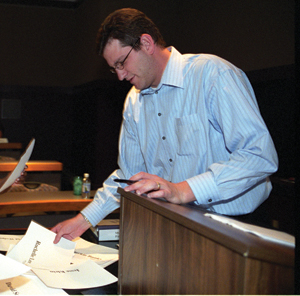 WUSTL Photo Services
WUSTL Photo ServicesThe University has added a number of courses to its curriculum for this coming semester, including classes related to the vice presidential debate which will be held on campus in October.
There are also new freshman Focus seminars and 300- and 400-level Arts & Sciences courses that will investigate a variety of updated subjects.
“We’re excited about the new courses,” Trevor Bilhorn, curriculum coordinator for the College of Arts & Sciences, said. “And we’re glad to have a vibrant curriculum.”
One of the most topical courses being offered is an 80-person class in the Olin Business School titled “The Business of Presidential Elections.” According to Steven Malter, who will be teaching the course, enrolled students will be examining the impact of the 2008 Presidential election on the world of business.
The class will include lessons on marketing and branding of the campaigns, polling and the differences between the candidates in their healthcare, tax and trade policies and how those policies will impact global business.
Although at this point enrolled students will not have a way to participate directly in the activity surrounding the vice presidential debate, Malter says that discussions are underway about ways to engage class members with the event, which will be held on campus on October 2.
“Americans and their Presidents,” a new freshman Focus course, will also study issues relevant to the nation’s highest office. Other new Focus courses to be offered include “Argentina: Past and Present,” an historical survey of Argentina that will culminate in a spring break trip to Buenos Aires, and “Phage Hunters,” a biology course in which students will take part in a national experiment organized by the Howard Hughes Medical Institute (HHMI).
Freshmen enrolled in “Phage Hunters” will collect bacteriophages in the soil outside of Rebstock Hall, then conduct lab work on the microscopic organisms, including isolation of their DNA. Upon completion of the course, instructors and one student from the class will attend a HHMI-hosted research symposium, and one of the collected phages will be selected for genome sequencing.
“Students will get experience in the field of genomics, an increasingly important area of biology research,” Professor Kathy Hafer, who will be team-teaching the course alongside several other members of the Department of Biology, wrote in an e-mail.
Hafer also notes the value of taking a more hands-on approach to an intro-level Biology course.
“I think the phage hunters course will be a more realistic experience with biology research than the typical introductory biology lab course,” said Hafer.
Several other new science courses have been added to the Arts & Sciences curriculum that deal with current issues, including a 100-level “Introduction To Global Climate Change In the 21st Century” in the Earth and Planetary Sciences department, and 400-level “Topics in the History of Eugenics” in Biology and Biomedical Sciences.
Other upper-level courses to be offered include 300-level “Advanced Hindi I,” a 400-level Anthropology course entitled “Tobacco: History, Anthropology, and Politics of a Global Epidemic,” and the 300-level “Hooking Up: Healthy Exploration or Harmful Exploitation?” which will be offered in the Women, Gender and Sexuality Studies (formerly Women and Gender Studies) program.
According to Professor Susan Stiritz, “Hooking Up” will examine young adult sexual culture through a study of students’ own sexual cultures, as well as through reading the relevant literature in gender theory and sexuality studies.
“We will explore if hooking up differs along axes of gender, sexual orientation, class, religion, and ethnicity-as well as class status,” wrote Stiritz in an e-mail. “I hope students will leave the course understanding better the cultural phenomenon of hooking up and its historical contexts.”
That course, like many of the other new classes being offered this semester, is already a popular one as measured by enrollment, with as many students on its wait list-22-as there are students in the class.
Wait lists aside, however, it seems that the biggest dilemma with all the new courses being offered this semester may be picking between them.